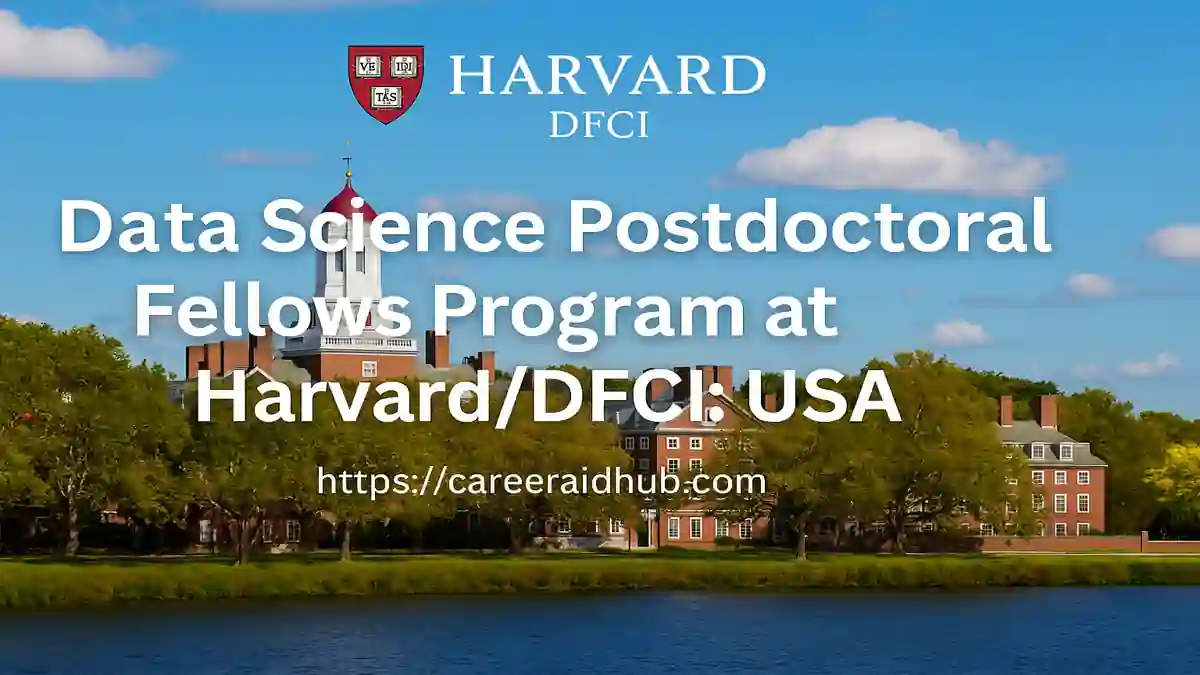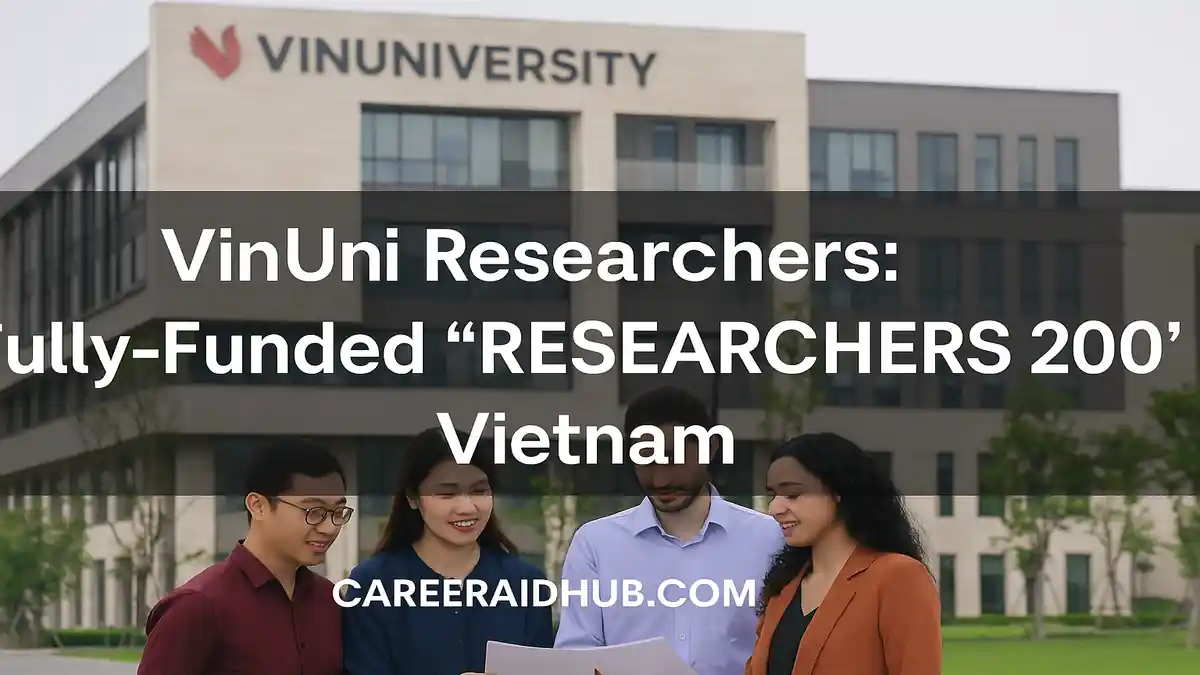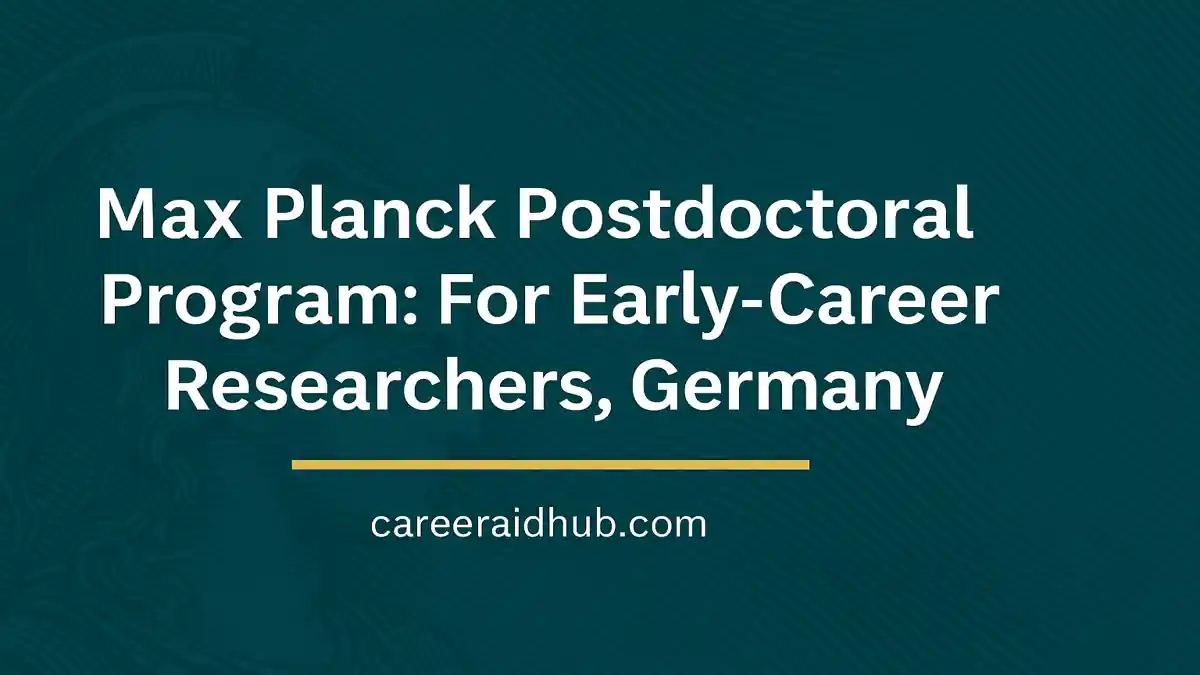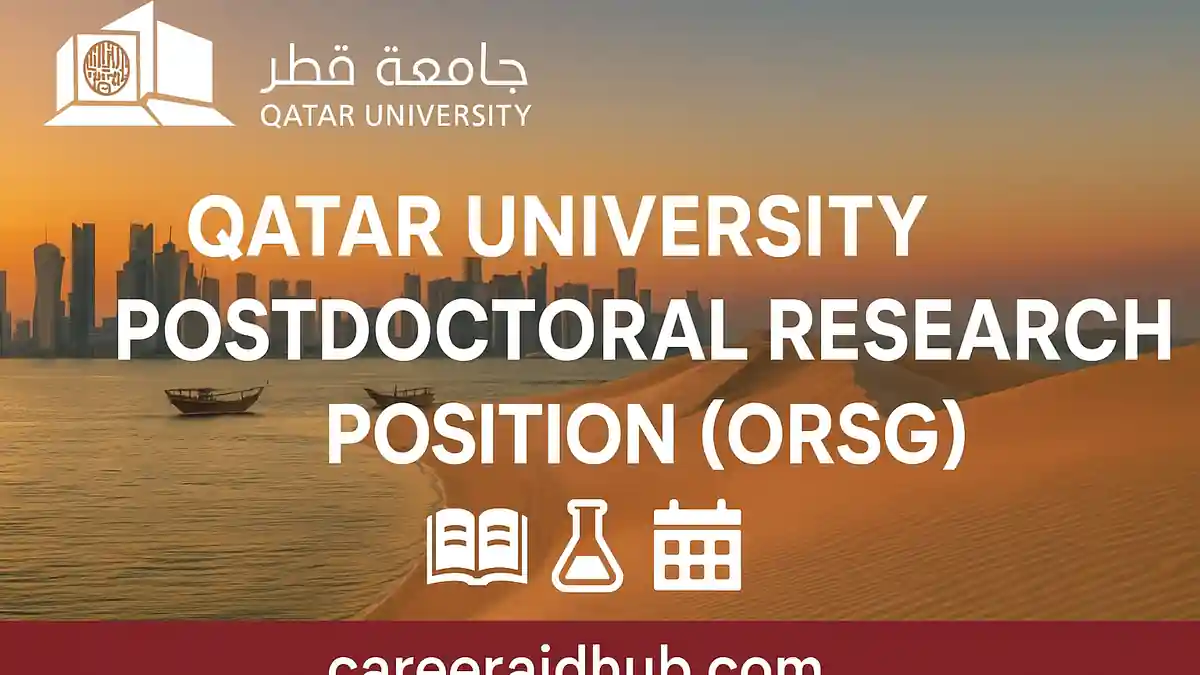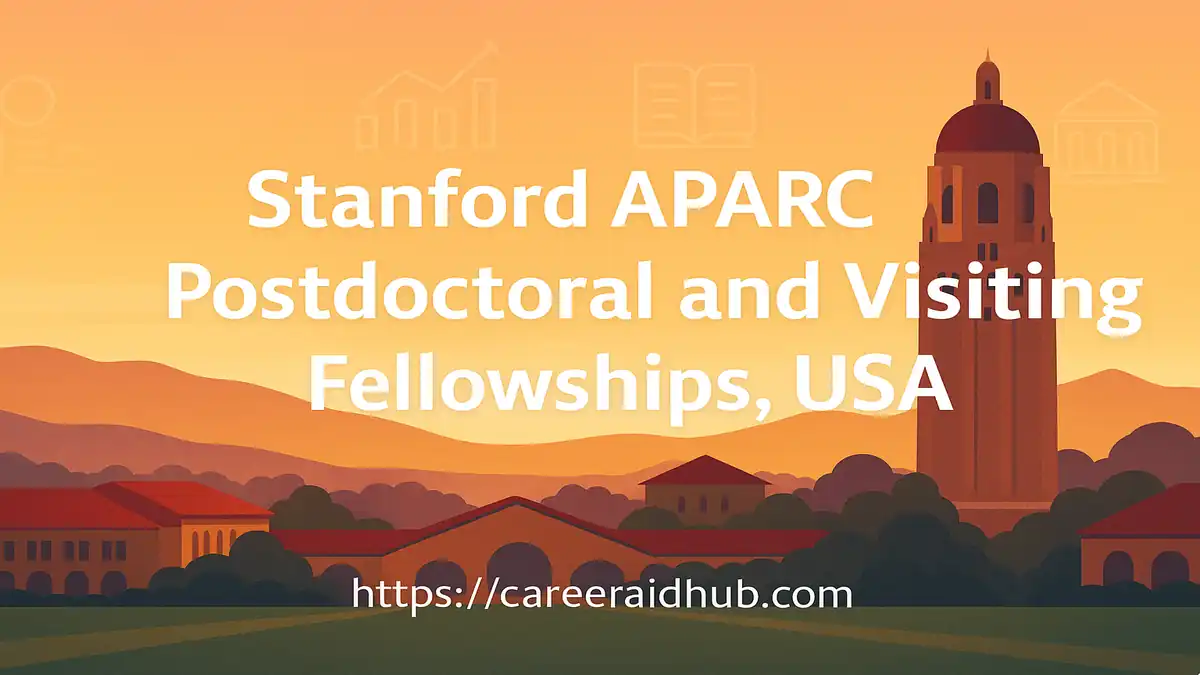Introduction to the Data Science Postdoctoral Fellows Program at Harvard/DFCI
In this guide, you will find a clear overview of the program, including eligibility, research areas, funding, mentoring structure, and the step-by-step application process. You will also see expert tips on how to position your profile, how to select mentors, and how to avoid common mistakes when applying to this highly competitive Harvard data science postdoctoral fellowship.
The Data Science Postdoctoral Fellows Program at Harvard/DFCI is a prestigious training opportunity for recent PhD graduates who want to apply statistics, machine learning, and computational biology to real cancer research problems. Hosted by the Department of Data Science at Dana-Farber Cancer Institute (DFCI) and affiliated with Harvard, this program combines rigorous quantitative work with direct impact on oncology.
Why the Data Science Postdoctoral Fellows Program Matters
For many early-career researchers, a postdoc is the bridge between a strong PhD thesis and an independent research career. However, this particular program offers more than a standard postdoctoral position.
Firstly, the Department of Data Science at DFCI is deeply integrated into cutting-edge cancer research. Faculty and fellows design methods for genomics, clinical trials, and AI in medicine, and they collaborate across basic, translational, and clinical departments.
Secondly, the Data Science Postdoctoral Fellows Program at Harvard/DFCI is oriented toward real-world impact. Fellows contribute directly to analysis pipelines, clinical trial design, biomarker discovery, and AI tools that support oncologists and scientists. As a result, your research outputs often combine methodological innovation with high-visibility biomedical applications.
Finally, the program builds a strong professional network. Because DFCI is a Harvard Medical School–affiliated institution in Boston, fellows interact with biostatisticians, computational biologists, clinicians, and collaborators across Harvard and nearby hospitals. This network can be decisive when you later apply for faculty positions or industry research roles.
Eligibility and Ideal Candidate Profile
Core Eligibility
According to the official program information, the department welcomes:
-
- Recent PhD graduates, and
- Doctoral candidates nearing completion,
with research interests in applied statistics, machine learning, or computational biology.
Your PhD can be in statistics, biostatistics, computer science, computational biology, applied mathematics, or a related quantitative discipline. What matters most is strong evidence of quantitative research ability and genuine motivation to work on oncology-driven problems.
Research Areas and Mentors
The program publishes a mentor list with representative projects. Current mentors
-
- Predictive and prognostic AI in oncology
- Spatial omics and single-cell cancer genomics
- Computational tools for chromosomal abnormalities and epigenetics
- Cancer evolution and adaptive clinical trial design
- Statistical methods for time-to-event outcomes
- Large-scale genomics and emerging high-throughput technologies
Consequently, applicants with experience in deep learning, Bayesian methods, causal inference, survival analysis, or large-scale genomic data will find a natural match.
Who Should Consider Applying
This program suits:
-
- Early-career researchers targeting academic careers in biostatistics, computational biology, or biomedical data science.
- Quantitative scientists planning to move into translational oncology or clinical data science.
- International applicants seeking a data science postdoc in Boston with strong Harvard affiliation and interdisciplinary exposure.
If your portfolio already includes co-authored papers, preprints, or software packages in relevant areas, you stand a stronger chance.
Key Features, Funding, and Training Environment
Funding, Salary, and Appointment
The Data Science Postdoctoral Fellows Program at Harvard/DFCI offers year-long appointments that are renewable, with an affiliation to Harvard. Fellows receive guaranteed funding, a competitive salary, and additional resources. The starting salary is currently listed as USD 75,000, and the package includes dedicated funds for conference
Because the role is a full-time postdoctoral position at DFCI, fellows are embedded in a rich academic environment and typically work on-site in Boston with some hybrid flexibility depending on project and lab needs.
Program Benefits and Cohort Structure
Incoming fellows join a defined cohort (for example, the 2026 Data Science Fellows cohort), which helps create a strong peer network. The department organizes:
-
- Informal training sessions and tutorials
- Seminar series featuring internal and external speakers
- Social and networking events for postdocs
In addition, a separate Collaborative Data Science Fellows Program supports cross-departmental projects where fellows are co-mentored by faculty in basic science or clinical departments plus a Data Science faculty mentor. This structure encourages deep engagement with biological problems while you refine your computational skills.
How to Apply to the Data Science Postdoctoral Fellows Program
Step 1: Review Official Information
Firstly, visit the official program page
You should read the mentor list, project descriptions, and application instructions carefully. This step helps you identify which faculty members align most closely with your profile and long-term goals.
Step 2: Prepare Core Application
Materials
Typically, applicants should assemble the following:
-
- Curriculum vitae with publications, software, talks, and teaching experience.
- Research statement explaining your previous work and proposed directions in data-driven oncology.
- Cover letter tailored to the program and specific mentors.
- Names and contact details of referees, who can later submit strong letters.
Although the official page uses a Google Form for submissions, you should always follow the most recent instructions in the “Apply Here” section rather than relying on older job adverts.
Step 3: Submit Application and Attend Information Session
Applications are welcomed on a rolling basis, with an informational session typically held in December, followed by interviews in late December or January. The page notes that initial decisions are usually made around March, but timelines may shift. Therefore, you should monitor the official site for the latest dates and announcements.
During the process, shortlisted candidates may be invited for virtual or in-person interviews with mentors and committee members. These discussions often focus on fit, research vision, and collaborative potential.
Practical Tips, Common Mistakes, and Expert Advice
Position Your Profile Strategically
Many applicants focus only on technical skills. However, selection committees also look for evidence that you can work effectively with biologists and clinicians. You should therefore:
-
- Highlight prior interdisciplinary collaborations or domain-specific projects in biology or health.
- Emphasize clear communication, reproducible workflows, and collaborative software practices.
- Show that you understand clinical or biological context, not only algorithms.
Tailor Your Mentor Preferences
The mentor list is a key strategic tool. For example, you might list two or three mentors whose interests match different aspects of your portfolio, such as cancer evolution modelling, AI for medical imaging, or clinical trial methodology. When you do this carefully, you demonstrate flexibility while still providing a coherent research narrative.
Avoid Common Mistakes
Several recurring problems weaken otherwise strong applications:
-
- Generic cover letters
Many candidates reuse the same letter for multiple fellowships. Instead, write a focused letter that references specific projects and methods used by potential mentors. - Overly technical research statements
A highly mathematical document with little biological motivation can be hard to evaluate. You should balance theory with clear examples of impact in genomics, imaging, or clinical data. - Late or rushed submissions
Because the program uses rolling review and sets informal timelines, strong candidates usually apply early. Early submission increases your chance of being considered before slots fill.
- Generic cover letters
Plan Your Next Career Step
You should also think beyond the postdoc. Many alumni aim for tenure-track roles at universities, data science positions in biomedical research institutes, or leadership roles in industry research labs. Therefore, you can use the fellowship period to:
-
- Build a focused set of high-impact papers.
- Develop public software packages and reproducible workflows.
- Gain experience supervising students or collaborating across multiple labs.
Conclusion and Next Steps
The Data Science Postdoctoral Fellows Program at Harvard/DFCI offers a rare combination of rigorous quantitative research, rich mentorship, and direct impact on cancer science. With a competitive salary, cohort-based structure, and strong Harvard affiliation, the program stands out among global data science postdoctoral opportunities in health and medicine.
If you are a recent PhD graduate or final-year doctoral candidate in statistics, machine learning, or computational biology, this fellowship can significantly accelerate your career. You gain access to world-class mentors, real-world datasets, and a collaborative environment in Boston’s leading medical research ecosystem.
To move forward, you should review the official program guidelines on the DFCI Data Science website, identify suitable mentors, and prepare a well-crafted application that highlights both your technical skill and your enthusiasm for oncology. Early planning, careful tailoring, and strong references will greatly improve your chance of success.
Finally, consider bookmarking this guide, sharing it with peers, and returning to the official page regularly for updated deadlines and mentor lists.
Summary Table
|
Feature |
Details |
|
Program Name |
Data Science Postdoctoral Fellows Program at Harvard/DFCI |
|
Host Country |
United States (Boston, Massachusetts) |
|
Funded By |
Dana-Farber Cancer Institute, with Harvard affiliation |
|
Duration |
Year-long fellowship appointments, renewable annually |
|
Study Mode |
Full-time, primarily on-site with hybrid flexibility depending on role |
|
Eligibility |
Recent PhD graduates or near-completion doctoral candidates in applied statistics, machine learning, computational biology, or related fields |
|
Financial Support |
Starting salary of approx. USD 75,000 plus funding for conference travel and computing equipment |
|
Fields of Study |
Biostatistics, machine learning, computational biology, genomics, cancer evolution, adaptive trial design, and related areas |
|
Deadline |
Applications welcomed on a rolling basis; interviews typically follow a December information session and early-year review cycle (check latest timeline on official site) |
|
Official Website |
Click here |
References
- Dana-Farber Cancer Institute Careers – Postdoctoral Fellowships, Department of Data Science – Job-level overview of the data science postdoctoral position, including location and employment type.
Frequently Asked Questions (FAQs)
The program targets recent PhD graduates and late-stage doctoral candidates in applied statistics, ML, computational biology, or related fields, with strong research skills and a clear interest in oncology data science.
A biology degree isn’t required. However, experience with biomedical data, genomics, imaging, or clinical research is very helpful. You should also show you can work well with biologists and clinicians and understand the scientific context of your projects.
The program lists a starting salary of about USD 75,000 for Data Science Postdoctoral Fellows, plus funds for travel and computing. Amounts may change, so always check the latest official announcement.
Yes, the program accepts strong international candidates. Visa steps and timelines vary by country and institution, so apply early and discuss logistics with the host once you are shortlisted.
Fellows receive one-year renewable appointments at Harvard, and many stay for several years. Renewals depend on performance, funding, and research fit, with progress and publications playing a key role.
Applications are reviewed on a rolling basis, with info sessions in December, interviews in late December or January, and decisions around March. However, timelines may shift, so always follow the dates on the official program page.
Most applicants identify two or three mentors whose work aligns with their experience. Review their recent publications and projects, and explain how your skills fit their research.
Strong applications blend technical excellence with clearly communicated impact in biomedical data science. Present a coherent research story, show collaboration, write polished statements, and include references who can speak to both your skills and teamwork.
Premium Mentorship for a Stronger Application
- Premium Mentorship: personalised 1:1 guidance for this and similar opportunities
- In-depth review of your CV, academic profile, and key statements
- Aligned with international selection criteria so your profile matches what panels expect
- Stronger, more compelling narrative for highly competitive calls
- Step-by-step support from opportunity mapping to final submission (fee-based)

